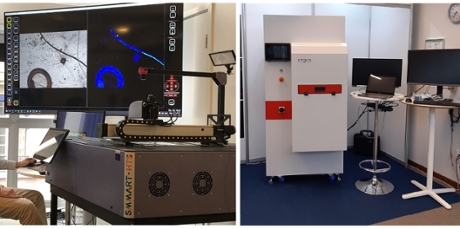AUAS develops teaching package for international SHUTTLE project
With the compliments of the European Commission
30 Jan 2023 10:06The international SHUTTLE project has now been completed after two years of research. In this project, partners from the Netherlands, France, Greece, Lithuania, Portugal and Israel developed a smart, automated microscope for forensic research. The Amsterdam University of Applied Sciences (AUAS) also collaborated on SHUTTLE: Iris Bijker and colleague Sanne Grolleman of the Forensic Science degree programme designed a teaching package that teaches how to use the microscope. “It’s very special to be able to immediately incorporate the latest techniques into education.”
The device developed for the SHUTTLE project has several advantages over other microscopes. For example, it can automatically perform certain operations which forensic researchers currently have to do manually, saving a lot of time. The microscope can also objectively analyse and classify traces from a crime scene, enabling laboratories worldwide to apply the same working method. “After two years of development and testing, the device is now ready for use,” says Bijker. “However, the parties involved are still keen to further perfect the technology in the coming years, especially in the field of artificial intelligence.”
Bijker, who was involved in designing the accompanying teaching package, says: “After completion, we submitted it to the European Commission, which assessed it as the grant provider. They told us that they were impressed by its quality and depth, which was a fine compliment.”
Flexible structure
The teaching package is an online course consisting of 12 lessons in which participants are taught about various subjects in articles, knowledge clips and videos. Each lesson ends with a quiz to test participants’ knowledge. Lessons 2 to 6 cover several basic forensic investigation techniques such as microscopy, polarisation, transmission, fluorescence, reflection and absorption. Lessons 7 to 11 cover different types of traces, such as fibres, hairs and blood. “You need this knowledge to understand how the microscope works,” Bijker explains.
To serve the largest possible target group with the course, each section opens with a section on general theory. For example, course participants first learn what polarisation means and how it is applied in forensic investigations. Only then is explained how polarisation is applied in the SHUTTLE microscope. Bijker says: “So even if you are not trained in forensics, it’s a valuable course, because you can apply the knowledge in all kinds of contexts. But those who want to can easily skip certain parts. Course participants can, based on their own background, assess which lessons are most relevant for them.”
Designed for a large target group
The flexible course structure also makes the course suitable for a large target group. Yet Bijker wants to test it one more time before it is made widely available: “We could only create the teaching package towards the end of the project, when it was known what tasks the microscope can perform. As a result, there’s not yet been time to test it on colleagues and students. We’re going to do that now.”
Bijker looks back on the SHUTTLE project with satisfaction. “It’s very interesting and instructive to participate in such a large European project. Normally it takes some time before new insights from research are incorporated into education, but we’ve now designed a teaching package while the technology has not even been put on the market yet. So we’re ahead in this at the AUAS!”
About SHUTTLE
SHUTTLE stands for 'Scientific High-throughput and Unified Toolkit for Trace analysis by forensic Laboratories in Europe'. The AUAS's role in this Horizon 2020 project is to design a course to teach students, the future experts, how to work with the new microscope. (Horizon 2020 is the European Commission's main grant programme for research and innovation.) The partners participating in the project are: Ministere de L'Interieur (France), the Netherlands Forensic Institute, Kentro Meleton Asfaleias (Greece), Lietuvos Teismo Ekspertizes Centras (Lithuania), Ministérion da Justica - Polícia de Judiciária (Portugal), ARTTIC, Ministery of Public Security - Israel national police (Israel) and the Amsterdam University of Applied Sciences (AUAS).


